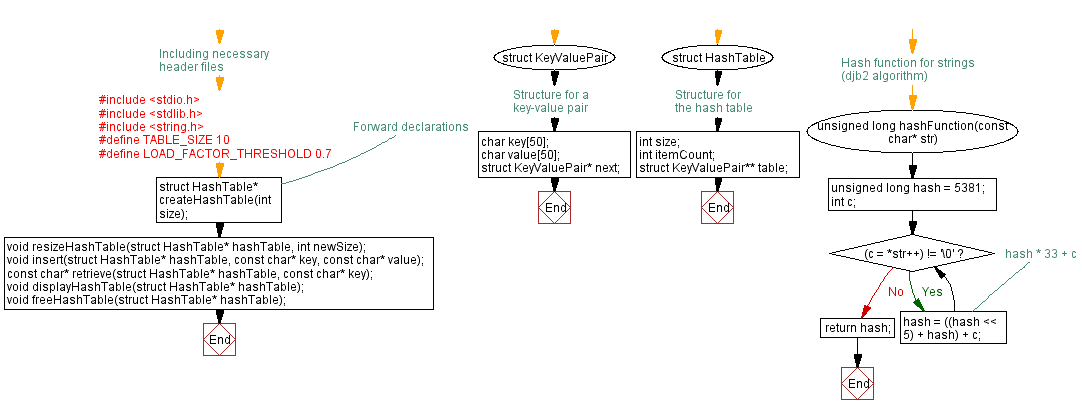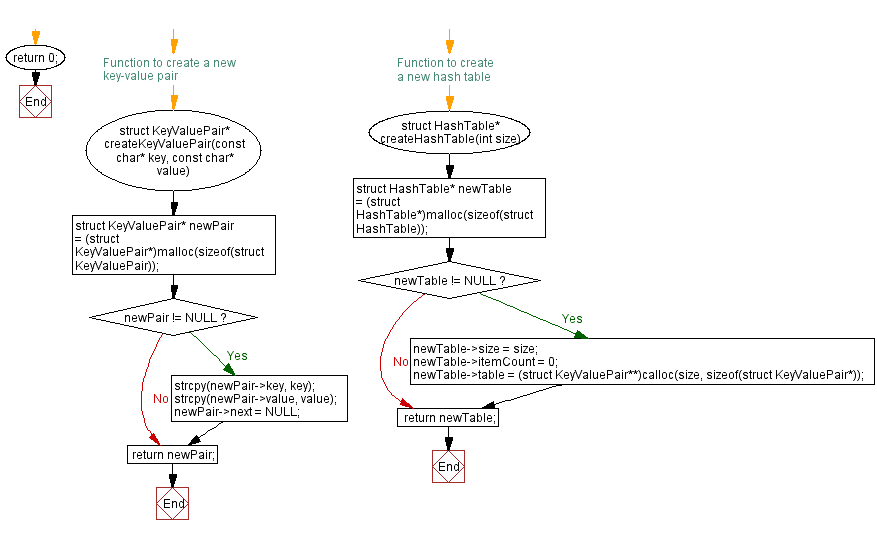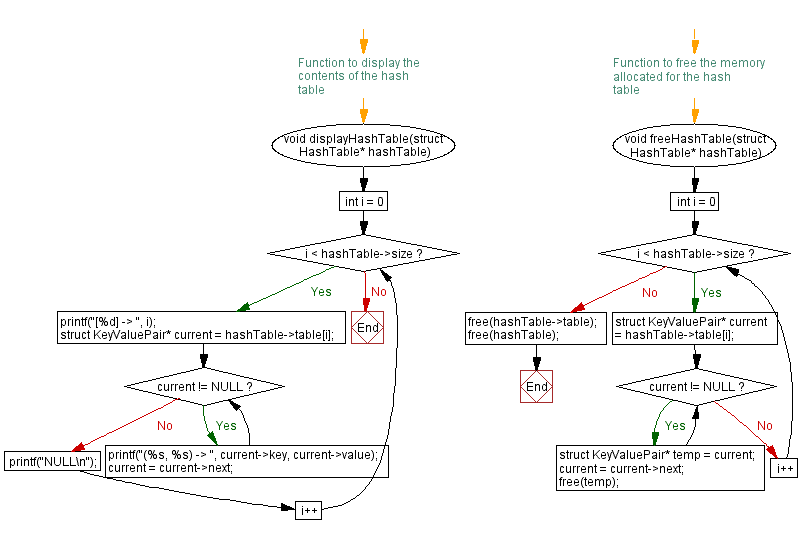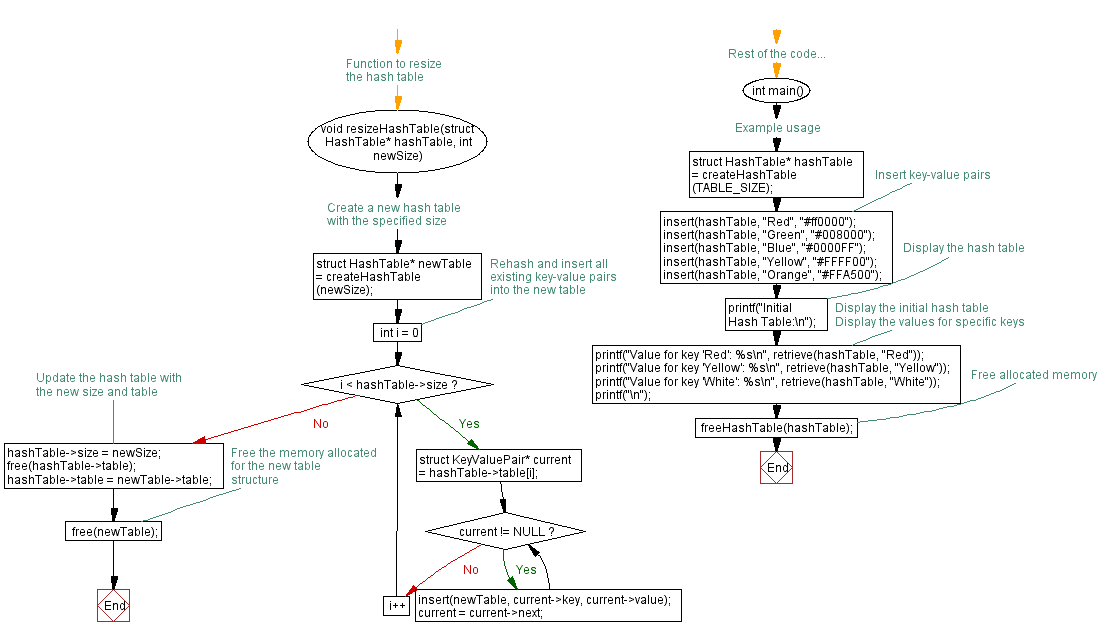Implementing dynamic resizing in a C Hash table
4. Dynamic Resizing Challenges
Write a C program that implements dynamic resizing in a hash table to automatically adjust its size when the load factor exceeds a certain threshold.
Sample Solution:
C Code:
// Including necessary header files
#include <stdio.h>
#include <stdlib.h>
#include <string.h>
#define TABLE_SIZE 10
#define LOAD_FACTOR_THRESHOLD 0.7
// Forward declarations
struct HashTable* createHashTable(int size);
void resizeHashTable(struct HashTable* hashTable, int newSize);
void insert(struct HashTable* hashTable, const char* key, const char* value);
const char* retrieve(struct HashTable* hashTable, const char* key);
void displayHashTable(struct HashTable* hashTable);
void freeHashTable(struct HashTable* hashTable);
// Structure for a key-value pair
struct KeyValuePair {
char key[50];
char value[50];
struct KeyValuePair* next;
};
// Structure for the hash table
struct HashTable {
int size;
int itemCount;
struct KeyValuePair** table;
};
// Hash function for strings (djb2 algorithm)
unsigned long hashFunction(const char* str) {
unsigned long hash = 5381;
int c;
while ((c = *str++) != '\0') {
hash = ((hash << 5) + hash) + c; // hash * 33 + c
}
return hash;
}
// Function to create a new key-value pair
struct KeyValuePair* createKeyValuePair(const char* key, const char* value) {
struct KeyValuePair* newPair = (struct KeyValuePair*)malloc(sizeof(struct KeyValuePair));
if (newPair != NULL) {
strcpy(newPair->key, key);
strcpy(newPair->value, value);
newPair->next = NULL;
}
return newPair;
}
// Function to create a new hash table
struct HashTable* createHashTable(int size) {
struct HashTable* newTable = (struct HashTable*)malloc(sizeof(struct HashTable));
if (newTable != NULL) {
newTable->size = size;
newTable->itemCount = 0;
newTable->table = (struct KeyValuePair**)calloc(size, sizeof(struct KeyValuePair*));
}
return newTable;
}
// Function to insert a key-value pair into the hash table
void insert(struct HashTable* hashTable, const char* key, const char* value) {
unsigned long index = hashFunction(key) % hashTable->size;
// Create a new key-value pair
struct KeyValuePair* newPair = createKeyValuePair(key, value);
// Insert the new pair at the beginning of the linked list
newPair->next = hashTable->table[index];
hashTable->table[index] = newPair;
// Update the item count
hashTable->itemCount++;
// Check if resizing is needed
if ((double)hashTable->itemCount / hashTable->size > LOAD_FACTOR_THRESHOLD) {
resizeHashTable(hashTable, hashTable->size * 2); // Resize to double the current size
}
}
// Function to retrieve the value associated with a key
const char* retrieve(struct HashTable* hashTable, const char* key) {
unsigned long index = hashFunction(key) % hashTable->size;
struct KeyValuePair* current = hashTable->table[index];
// Traverse the linked list at the index
while (current != NULL) {
if (strcmp(current->key, key) == 0) {
return current->value; // Key found, return the value
}
current = current->next;
}
return "Key not found"; // Key not found
}
// Function to display the contents of the hash table
void displayHashTable(struct HashTable* hashTable) {
for (int i = 0; i < hashTable->size; i++) {
printf("[%d] -> ", i);
struct KeyValuePair* current = hashTable->table[i];
while (current != NULL) {
printf("(%s, %s) -> ", current->key, current->value);
current = current->next;
}
printf("NULL\n");
}
}
// Function to free the memory allocated for the hash table
void freeHashTable(struct HashTable* hashTable) {
for (int i = 0; i < hashTable->size; i++) {
struct KeyValuePair* current = hashTable->table[i];
while (current != NULL) {
struct KeyValuePair* temp = current;
current = current->next;
free(temp);
}
}
free(hashTable->table);
free(hashTable);
}
// Function to resize the hash table
void resizeHashTable(struct HashTable* hashTable, int newSize) {
// Create a new hash table with the specified size
struct HashTable* newTable = createHashTable(newSize);
// Rehash and insert all existing key-value pairs into the new table
for (int i = 0; i < hashTable->size; i++) {
struct KeyValuePair* current = hashTable->table[i];
while (current != NULL) {
insert(newTable, current->key, current->value);
current = current->next;
}
}
// Update the hash table with the new size and table
hashTable->size = newSize;
free(hashTable->table);
hashTable->table = newTable->table;
// Free the memory allocated for the new table structure
free(newTable);
}
// Rest of the code...
int main() {
// Example usage
struct HashTable* hashTable = createHashTable(TABLE_SIZE);
// Insert key-value pairs
insert(hashTable, "Red", "#ff0000");
insert(hashTable, "Green", "#008000");
insert(hashTable, "Blue", "#0000FF");
insert(hashTable, "Yellow", "#FFFF00");
insert(hashTable, "Orange", "#FFA500");
// Display the hash table
printf("Initial Hash Table:\n");
// Display the initial hash table
// Display the values for specific keys
printf("Value for key 'Red': %s\n", retrieve(hashTable, "Red"));
printf("Value for key 'Yellow': %s\n", retrieve(hashTable, "Yellow"));
printf("Value for key 'White': %s\n", retrieve(hashTable, "White"));
printf("\n");
// Free allocated memory
freeHashTable(hashTable);
return 0;
}
Output:
Initial Hash Table: Value for key 'Red': #ff0000 Value for key 'Yellow': #FFFF00 Value for key 'White': Key not found
Explanation:
In the exercise above -
- Header Files and Definitions:
- The code includes standard C libraries (stdio.h, stdlib.h, string.h) and defines constants like TABLE_SIZE and LOAD_FACTOR_THRESHOLD for hash table sizing.
- Structures:
- KeyValuePair: Represents a key-value pair with fields for the key, value, and a pointer to the next key-value pair in case of collision.
- HashTable: Represents the hash table structure with fields for size, item count, and an array of pointers to key-value pairs.
- Hash Function (hashFunction):
- Implements the djb2 algorithm to generate a hash value for a given string key.
- Functions:
- createKeyValuePair: Allocates memory and creates a new key-value pair.
- createHashTable: Allocates memory and creates a new hash table with a specified size.
- insert: Inserts a key-value pair into the hash table, handling collisions using separate chaining.
- retrieve: Retrieves the value associated with a given key from the hash table.
- displayHashTable: Displays the contents of the hash table, including chained key-value pairs.
- freeHashTable: Frees the memory allocated for the entire hash table.
- resizeHashTable: Resizes the hash table when the load factor exceeds a specified threshold.
- Main Function (main):
- Illustrates an example usage of the hash table.
- Inserts key-value pairs into the hash table.
- Retrieves and prints values for specific keys.
- Displays the initial hash table and values for specific keys.
- Frees the allocated memory for the hash table.
Flowchart:




For more Practice: Solve these Related Problems:
- Write a C program to implement a hash table that halves its size when the load factor falls below a threshold.
- Write a C program to dynamically resize a hash table and rehash all keys with minimal interruption to operations.
- Write a C program to implement a hash table that supports both upscale and downscale resizing based on current load.
- Write a C program to implement a hash table that prints its new size after each dynamic resizing operation.
Go to:
PREV : String Hash Function Challenges.
NEXT : Extended Hash Table Operations Challenges.
C Programming Code Editor:
Have another way to solve this solution? Contribute your code (and comments) through Disqus.
What is the difficulty level of this exercise?
Test your Programming skills with w3resource's quiz.
